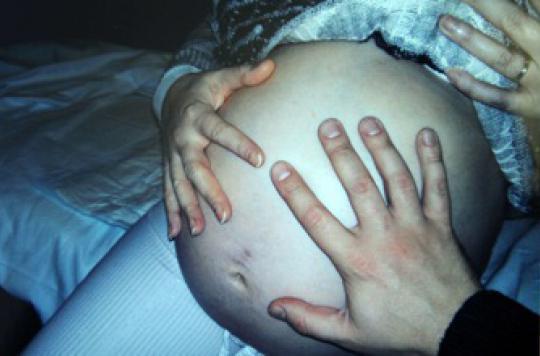The abdominal expression, which consists of pressing on the belly of a woman who gives birth to “help”, is not recommended, but still practiced in one in three cases according to a survey.

“Great pain and emotional shock”: this is how a woman experienced her abdominal expression. This practice, which consists in pressing on the belly of the pregnant woman to “help” her to give birth more quickly, is nevertheless not recommended by the Haute Autorité de Santé (HAS) since 2007. Seven years later, it is still practiced according to a survey by Interassociative collective around birth (Ciane), relayed by the Medical Press Agency (APM).
Broken ribs and pain
In one out of three first deliveries, in 2013, abdominal expression is practiced. The rate fell sharply after the recommendations of the HAS, but it started to rise again in 2012. More alarming finding: among multiparous people, the rate of abdominal expressions has not fluctuated since 2007, although a little more low (14%). Due to the lack of medical indication, and the slight risk of serious complications, the HAS has decided to strongly advise against its recourse. In the testimonies collected by the Ciane, some women evoke broken ribs and strong pain.
“A feeling of violence”
For parents, the feeling of such a practice is rarely positive. In more than four out of five cases, the woman’s consent is not even requested. “No request but a warning:” I will have to press on your stomach, it’s that or the forceps “”, evokes a woman. This constitutes a violation of patients’ rights, according to Ciane.
But above all, adds the Colective, “this gesture is associated with a feeling of violence (…) and is therefore very badly experienced by women. “” I was shocked to see a midwife press on my stomach and almost sit down (…) on the pretext that I was not pushing hard enough “, testifies a young mother. Another mentions the use of a stepladder to help caregivers to support. However, some women point out that the experience went well, and that the team informed them of the nature of the act before performing it.
Still, the HAS would prefer to see this practice disappear and replaced by instrumental extraction or cesarean section. Ciane therefore calls for a review of practices within establishments, so that they respond to the recommendations. But above all, it is necessary to inform women “fairly” about the risks of an abdominal expression.
.

















